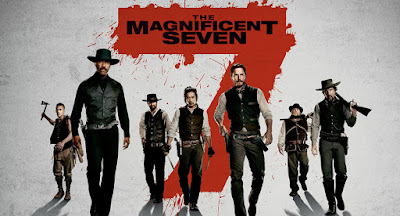The Magnificent Seven (2016)
Directed by: Antoine Fuqua
Screenplay by: Nic Pizzolatto, Richard Wenk
Starring: Denzel Washington, Chris Patt, Ethan
Hawke, Vincent D’Onofrio, Byung-hun Lee, Manuel Garcia-Rulfo, Martin Sensmeier,
Hayley Bennett, Peter Sarsgaard.
Expectations do not bear a conundrum. Take movies,
for instance. You experience a great film and then, when it’s time to make your
conscience aware of another feature film, the former expects to relive the same
greatness. Even more, if it’s the same genre. This is not a deliberate effort,
but the algorithm of brain’s evolution is honed in such a manner. The same
expectation which the DC fanatics writhe with; post Christopher Nolan’s
thrilling and philosophical Batman saga.
The gripping genre: ‘Wild West’ or simply, ‘Western’,
invoke a carnivorous, blood-thirsty and passionate vibe within me and many of
you, perhaps. ‘Django Unchained’, ‘Once
Upon A Time In The West’, ‘The Good, the Bad and the Ugly’ and many other
Western movies have set a tone, in which the cowboys, their savage antagonists
(irony), the timid victim, altogether create crackerjack plots and hence, give
rise to a magnificent story. In The
Magnificent Seven, I couldn’t find such magnificence. In the following
statements, I will explain how this movie failed to parallel my expectations.
The story is the backbone of a movie. Details are
what should be pondered upon, before finalizing the script. Should a writer wonder
whether each dialogue delves into the moral fibre of the character and whether
he/she is writing an original piece or just following a mediocre dogma? Yes, he
should! This movie lacked a sturdy backbone. A woman’s quest to avenge the
death of her husband by hiring seven talented hunters to raise hell against a
powerful trader and his army, could have led to a visual poetry, perfectly
grand to be inducted into the ‘Cult-classic’ category, in the years to come.
But again, the writers got allured by the charms of dogma.
It is certain that I cannot judge the deeds of a
director in a particular movie, in a manner that professional directors would do. It
is also certain that I am not blind. Being naïve is a tangible choice. In this
case, I ignore the choice. Where some scenes - like the wide shot of Denzel
Washington and Hayley Bennett riding their horses against the tangerine dusk or Byung-hun
Lee and Ethan Hawke training the spooked farmers or the initial skirmish
between The Seven and Bartholomew
Bogue’s (the trader) men or some perfectly timed close-up shots exposing
the emotions of the struggling victors in the final war – made me think that the
director, Antoine Fuqua is capable of visualising an ascending linear narration;
the rest of the movie made it clear that he just wants to show us a replica of a Marvel Studio’s
war story with cowboys and ”Texicans” . War stories, that can leave only a
sixth-grader, bedazzled.
The tea was brewed
with a behemoth potential and the cup was strong enough to carry it, but
the saucer was faint-hearted. It was either scared or inapt for the duo. The tea was poured and the cup moulded it into a magnificent shape, but, on touches the cup to the saucer and the
saucer quivers. The cup dangles around the saucer’s curb and the tea spills.
Though the cup does not fall, it spills the good half of the tea. The person
watches the entire action and now with a stained desire sips only the
remainder. He knows that the tea is divine, that the cup has its base
well-guarded, and that it’s the saucer which robbed the divinity of the act of
drinking a cuppa full of tea.
Saucer – The Script, the mediocre direction by the director.
Cup – The sets, setting and the occasionally displayed aesthetic side of the
director.
TEA – THE ACTORS
AND THE ACTRESS IN THE LEADING ROLES.
P.S. I kept imagining Daniel Day-Lewis in the role of
Bartholomew Bogue (the antagonist), just because There Will Be Blood. Haha?

